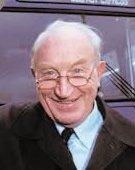|
|
||||||||||||||||||||||||
 |
Featured person
Henry George Ferguson
Recently added |
Werner Heubeck (1923 - 2009)
Werner Heubeck definitely had a varied career path, and this included 23 years when he was a well-known figure in Ulster, being manager of the two bus services, Citybus and Ulsterbus, which were frequently targeted, damaged and destroyed during the years of the Troubles, with employees killed and depots attacked. Werner Wolfgang Heubeck was born in Nuremberg, southern Germany, son of a gasworks engineer. He left school without qualifications, and joined the Hitler Youth, and later joined into Hermann Goering Division of the Luftwaffe, which was considered an elite group. He saw service in Italy and France before joining the Afrika Korps. In 1943 he was one of 60 survivors when his troopship was sunk off the coast of Tunisia (nearly 300 were killed), and after a four-mile swim to shore, was taken prisoner by the US Army. He was repatriated in 1946 and worked at the Nuremberg trials as a translator and proofreader. It was there he met a Welsh lady, also working there and who had formerly worked at Bletchley Park, the wartime code-breaking centre; they married and were permitted to settle in Britain, where he took citizenship in 1954. His various jobs included managing a paper mill in Aberdeen. While there he saw an advertisement for a post managing the bus services in Northern Ireland, a rôle about which knew nothing; he visited the manager of his local bus depot, spent a day with him to learn about the business, and made a trip to Northern Ireland where he picked up valuable tips from unwitting bus drivers about locations where they would park their buses for unscheduled breaks. He impressed the Ulster transport authorities sufficiently that they offered him the job. His first challenge was to reorganise a loss-making public body (the Ulster Transport Authority). This he managed to do, announcing staff cuts to the staff themselves at mass meetings, which were capable of being fraught, with open hostility being shown him. As a measure of his efficient planning, when the new body, Ulsterbus Ltd, commenced trading on April 17, 1967, new duty schedules, with only minor adjustments in frequency and timing, required 1200 bus staff, as against the theretofore 1600. This was on the threshold of the Troubles, which saw the bus services quite literally in the firing line. Despite the loss of hundreds of vehicles, and numerous disruptions caused by security alerts - not to mention attacks on staff, some fatal - Heubeck managed to keep the services running, and running profitably, a considerable achievement of logistics. However, his public profile was considerably raised by his frequently boarding buses to remove what in Ulster were referred to as "suspicious objects", a type of euphemism for what were either real bombs, what were made to look like bombs, or, in the anxious times that the Troubles were, harmless bags and other objects which were treated as if they were bombs. On many dozens of of occasions, Heubeck carried such objects off buses himself, or, as on one occasion, he drove away to a less dangerous location a bus on which a bomb had been planted under the driver's seat. There were numerous tales of incidents of this nature. Heubeck typically shrugged off his actions, explaining that he was simply aiming at a more efficient service, that he had come to be able to tell a real bomb from a hoax, that he needed to set an example to his staff to show them that he too was prepared to pull his weight. Yet there was no doubt that he voluntarily placed himself in real danger of being killed, to the bafflement and sometimes annoyance of the security forces. He certainly earned the respect and affection of the public, perhaps enhanced by his slightly eccentric, outré persona; usually seen clad in an old raincoat, and trilby long after these were fashionable, he could also be seen jogging through the streets long before that activity became fashionable. His excellent English was nonetheless heavily accented, giving a slight impression of gruffness, but he had, less publicly, a capacity for providing counselling for staff and their families in what was a high-risk occupation. He had a number of hobbies of which one was knitting. On retirement he was given as a gift, at his request, a large quantity of wood, which he used to carve various objects and other artefacts, some for local churches, others to commission. Initially he and his wife lived in retirement in County Antrim, but later they moved to Shetland. In 1977 he was appointed OBE and in 1988, the year he retired, CBE. Interviewed on television after one of these investitures, he was asked if the Queen had conversed with him. This former Afrika Korps soldier and Hitler Youth member replied that she had indeed asked him what he did, and that he had simply replied "I run the buses!" That he most certainly did. He added that the Queen responded that this must be an interesting occupation, to which Heubeck claimed he replied that yes, it was, but "sometimes too damned interesting". He died of cancer, which had been diagnosed some years before.
|
 |
|||||||||||||||||||||

|
Home | Our Policies | Plaques | Browse | Search | Sponsors | Links | Help | Contact Privacy & Disclaimer | Cookie Policy | Site Map | Website Design By K-Point © 2024 Ulster History Circle |
|||||||||||||||||||||||









